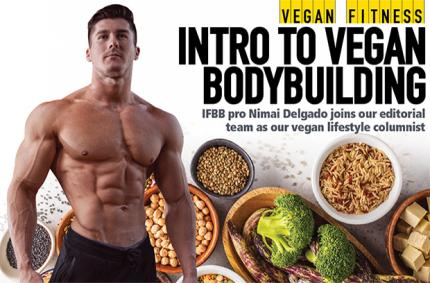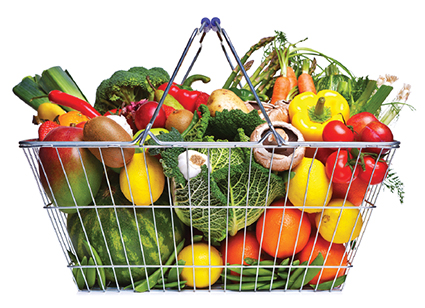Vegan Fitness

Nimai Delgado is a natural, vegan IFBB professional bodybuilder, certified health coach, podcast host, mechanical engineer, and founder of veganfitness.com. Nimai is not your average “meathead”. He was raised on a lacto-vegetarian diet since birth and transitioned to a fully plant based diet in 2014. He began competing in 2015 and quickly climbed up the ranks of the bodybuilding world while simultaneously showing that athletes can build muscle and thrive on a vegan diet. He now uses his platforms to educate millions about the benefits of eating more plants.

Introduction to Vegan Bodybuilding
Nimai “The Plant Slayer” Delgado joins our editorial team as our vegan lifestyle columnist.
People are often in awe at my accomplishments and physique as the first vegan IFBB pro. Most are quick to say that it’s impossible to be a bodybuilder without animal protein, but if I can do it, so can you.
I get a lot of questions about my lifestyle, given that my physique was built purely by plants. Where do you get your protein from? Is it even healthy? Won’t I eat too much carbs? Won’t I lose all my muscles? Do I need to supplement to avoid massive deficiencies?
The uncertainty around vegan bodybuilding is understandable, but it mainly comes from a lack of understanding. Veganism, although an ever-growing lifestyle, still only accounts for a small amount of the population and, out of that population, not every individual is interested in bodybuilding and fitness. This means that only a select few have discovered what I have—that veganism isn’t just good for bodybuilding but optimal for all types of athletes.
Let’s cover just a few of the questions I get. First, where do I get my protein from? Simply put, the same place as animals get theirs. All protein originates initially from plants, so why rely on meat and animal products in your diet when you can go directly to the source?
 Tempeh, lentils, nuts, seeds, tofu, seitan, beans, pulses, and legumes are all great protein sources. Plants also contain a whole roster of micronutrients, which make them anti-inflammatory, prevent oxidation in the body, and help assist performance and recovery. Some sources cite one to two grams per pound of body weight for protein, which is excessive compared to the amounts studied by leading sports scientists. In keeping with better recommendations, I go for a 0.81 gram per pound approach.1
Tempeh, lentils, nuts, seeds, tofu, seitan, beans, pulses, and legumes are all great protein sources. Plants also contain a whole roster of micronutrients, which make them anti-inflammatory, prevent oxidation in the body, and help assist performance and recovery. Some sources cite one to two grams per pound of body weight for protein, which is excessive compared to the amounts studied by leading sports scientists. In keeping with better recommendations, I go for a 0.81 gram per pound approach.1
I learned this personally when I transitioned from whey protein to plant-based protein shakes and found that my digestive distress completely faded. It’s pretty amazing how much animal products are hindering your performance. You rarely notice until you finally start phasing them out. Mind you, it shouldn’t come as a surprise. A recent study found that the advantages of plant-based performance include less body fat, better blood flow, and increased cardiovascular health and capacity. These are all vital for getting the most out of an intense training block.2
 Many people are concerned about the amount of carbohydrates in a vegan diet, but let me put your mind to rest: Carbs aren’t the enemy. Carbohydrates are actually the body’s main fuel source, with carbs being converted into glycogen, which we need for energy and performance. No carbs, no energy. It’s that simple. Fat can be used as a source, true, but only by being converted to glycogen in the body, making it much less efficient.
Many people are concerned about the amount of carbohydrates in a vegan diet, but let me put your mind to rest: Carbs aren’t the enemy. Carbohydrates are actually the body’s main fuel source, with carbs being converted into glycogen, which we need for energy and performance. No carbs, no energy. It’s that simple. Fat can be used as a source, true, but only by being converted to glycogen in the body, making it much less efficient.
But what’s important with carbohydrates isn’t necessarily the amount; it’s the quality. Many refined carbs are simple in nature, giving a quick burst or energy and calories, but they contain very little fibre, which is essential for keeping the body at peak performance.
A whole-foods plant-based diet, on the other hand, is primarily based on complex carbohydrates, which release energy gradually over the day. This allows you to train without energy spikes and leaves some energy in the tank for the recovery process too. Our muscle growth happens outside of the gym, after all, primarily when we sleep.
Unlike traditional animal protein sources, most vegan protein staples are also complex carb sources, meaning they have more benefits than your average animal-based protein source because they come packed with vital micronutrients that can help balance and regulate hormones such as magnesium and zinc.
 It’s for these reasons (and more) that a vegan diet is actually optimal for making progressive gains with minimal recovery time, making it a bodybuilder’s dream diet.
It’s for these reasons (and more) that a vegan diet is actually optimal for making progressive gains with minimal recovery time, making it a bodybuilder’s dream diet.
“But wait,” you might be thinking, “Won’t I need to supplement every vitamin under the sun to function as a vegan?”
Well, if you live in a dim-weather climate, you might need to supplement vitamin D to maintain optimal levels because of lack of sun, but other than that, there’s very little you have to worry about.
Most vitamins and other micronutrients can easily be gained through a balanced vegan diet, with B12being the exception. Most people get their B12from animals (who most likely have been supplemented on B12themselves) so, again, it’s just a case of getting closer to the source and skipping the middleman.
A vegan diet may even give you the edge. Many people are lacking in micronutrients, whereas vegans tend to be much more nutrition-aware, enhancing their performance through plants.
So what are you waiting for? A gradual adjustment to a vegan diet might be the edge that your training is lacking. As someone who has never consumed meat, I can say with certainty that it’s absolutely not required for bodybuilding. With more and more research strongly suggesting it’s beneficial to eliminate meat from our diets, and more tasty plant-based options available than ever before, there’s never been a better time to cut it out.
REFERENCES- Morton RW, Murphy KT, McKellar SR, et al. A systematic review, meta-analysis and meta-regression of the effect of protein supplementation on resistance training-induced gains in muscle mass and strength in healthy adults. Br J Sports Med. 2018 Mar;52(6):376-384.
- Barnard ND, Goldman, Loomis JF, et al. Plant-based diets for cardiovascular safety and performance in endurance sports. Nutrients. 2019 Jan 10;11(1).
Get articles delivered to you each month by signing up for a FREE issue to Muscle Insider newsletter. Just click here.

